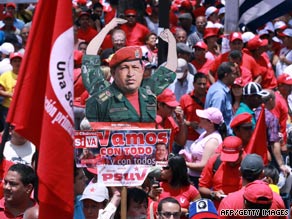Venezuelan minister: More radio closures coming
(CNN) -6-9-09- The Venezuelan government initiated a new charge against a private television broadcaster and said that 29 additional radio stations would soon be closed, the latest move in what critics call a crackdown on freedom of expression.

Demonstrators hold up a picture of Venezuelan President Hugo Chavez at a pro-Chavez rally on Saturday
The Saturday announcement by Minister of Public Works and Housing Diosdado Cabello, who oversees the state telecommunications regulator, came at a counter-rally to marches protesting the hardline tactics of President Hugo Chavez.
Friday's marches against Chavez were in part to protest the government's closure of 32 radio stations and two television broadcasters last month. The government said the stations were shut down for violations relating to their broadcast licenses. Critics say the president was clamping down on critical press.
"There are 29 [radio stations] that will be off the air shortly," Cabello said at Saturday's pro-Chavez rally.
Cabello also announced a new legal complaint against television broadcaster Globovision as a sanction for allegedly calling for a coup against Chavez during its coverage of Friday's rallies.
Globovision carried text messages from viewers on a ticker on the bottom of the screen during the anti-Chavez protests that called for an overthrow of the government, Cabello said.
Don't Miss
"If you call for a coup, if you call for assassination, assume your responsibility," he said.
The government has already initiated a number of charges against Globovision. The station, known for being critical of Chavez, is being investigated for breaking a law on "social responsibility" on some programs on certain dates. The station violated a statute that makes it illegal to utilize telecommunication channels to further criminal acts, the government alleges.
Venezuelan authorities had also opened an investigation into whether Globovision broke the law May 4 when it reported about an earthquake before an official report had been issued on the matter.
Two other investigations had previously been launched against the station.
The relationship between privately-owned media in Venezuela and the leftist Chavez have never been rosy. Chavez has accused private television stations of supporting his brief ouster in 2002, and the president was a driving force behind denying a license renewal in 2007 to one broadcaster he said cooperated with the opposition.
No comments:
Post a Comment